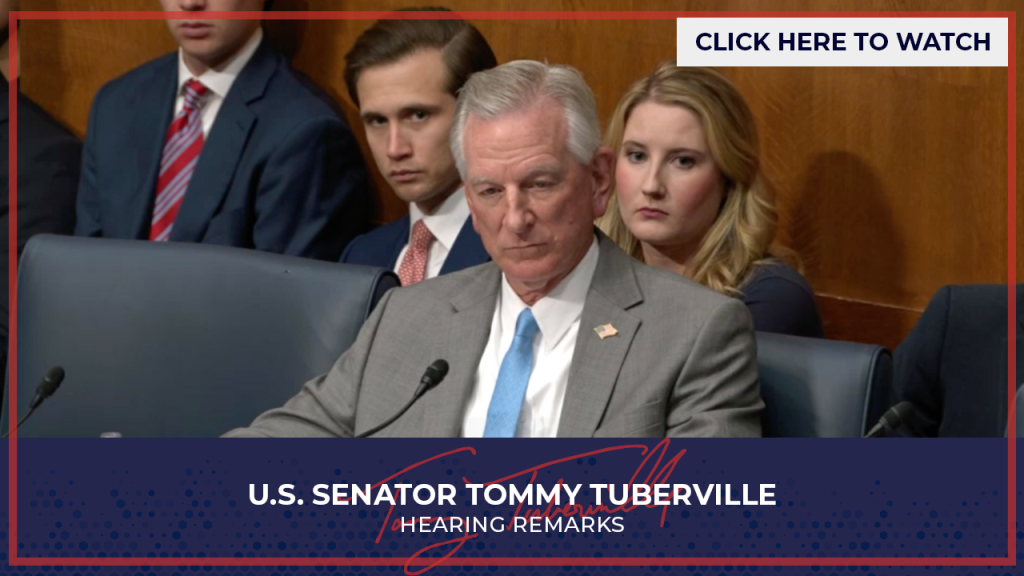WASHINGTON – Today, U.S. Senator Tommy Tuberville (R-AL) spoke with witnesses during a Senate Health, Education, Labor & Pensions (HELP) Committee hearing about the impacts of the 340B program on hospitals in Alabama. Sen. Tuberville noted the importance of these discounts to the day-to-day operation of many of Alabama’s hospitals.
The witnesses included Michelle Rosenberg, Director of Health Care at the U.S. Government Accountability Office; Dr. Aditi Sen, Chief of the Health Policy Studies Unit at the Congressional Budget Office; and Dr. William Feldman, Physician and Health Policy Researcher at the University of California Los Angeles.
Read Sen. Tuberville’s remarks below or on YouTube or Rumble.

TUBERVILLE: “Thank you, Mr. Chairman.
Thanks for being here today. Real quickly, the 340[B] Program is [one of] the only—and I repeat only—source of income for America’s hospitals that isn’t taxpayer funded. Taxpayers are carrying the whole load other than this here. We should be expanding this, not reforming it. I’ve got a hospital, East Alabama [Medical Center], in Opelika, Alabama that shared with me that in 2025, they provided almost $100 million dollars in uninsured care. Majority of that was [for] illegals. During the same period, they received $70 million in 340B savings. In the past years, 340B revenue does not cover the loss from uncompensated care. Additionally, there is pressure to expand healthcare services all over my state. We’re dropping beds. We are sinking. Thank goodness, we’ve got the $50 billion coming for rural health care from the One Big Beautiful Bill. East Alabama [Medical Center], along with many hospitals, know that the 340B program is working as intended to help offset uninsured losses. The 340B program established a clear and fair expectation that pharmaceutical manufacturers want their drugs covered by Medicare and Medicaid.
Ms. Rosenberg, would reforming 340B in a way that undermines [a] hospital’s ability to provide for uninsured patients go against the program’s original purpose?”
ROSENBERG: “Thank you for the question. I would note [that] the statute doesn’t specify what the purpose of the program is. What individuals have relied on is something in House report language for a bill that was similar to that implemented 340B program, which was to enable covered entities to stretch scarce federal resources, to reach more eligible patients and provide more comprehensive services.
So, it would seem that if that’s the intent, then the 340B program is allowing entities to do that.”
TUBERVILLE: “Thank you. What other forms of discounts or financial assistance do at-risk hospitals receive that is not taxpayer funded? Do they receive anything?”
ROSENBERG: “I don’t have full knowledge of all of those programs, but there’s none that I’m aware of.”
TUBERVILLE: “83% of rural hospitals in my state operate at a loss. Think about that, 83%. If other states want to highlight hospital systems that are flushed with cash, […] reform efforts should be directed towards those. That’s my opinion. You can’t go towards people that are losing money already. Not towards states like mine that rely on 340B discounts for survival. We absolutely survive off [of] these. Without support [from] essential services such as mental health and substance abuse treatments, if this happens and we reform it and cut back, those all will disappear—forcing rural patients to seek care at hospitals that are already barely getting by.
What would meaningful reform look like for a state that is rural, poor, and has demonstrated that it is not abusing this program?”
ROSENBERG: “So, our recommendations really focuses on HRSA’s oversight of the program, and so that’s making sure that the entities that participate are eligible to participate and making sure that they follow program requirements. So, don’t divert drugs to individuals who aren’t patients of the entity and also don’t create duplicate discounts in which manufacturers are required to pay both a rebate under the Medicaid Rebate Program and the discounted 340B price.”
TUBERVILLE: “Thank you.
Dr. Sen, based on your research into how the 340B program affects hospital spending, how can we ensure that community health centers in my state continue using their 340B savings directly to benefit patients rather than losing resources to the larger systems or middlemen.”
SEN: “Thank you for that question. So, at the Congressional Budget Office, we would not recommend specific policy approaches. But I will say that for our work, better data on how covered entities are using 340B revenues could inform that policy discussion.”
TUBERVILLE: “What would you consider a wasteful or fraudulent program in a hospital using 340B. Have you seen any of those?”
SEN: “To date, we do not have the data to be able to track how 340B entities are using 340B revenues generated by their program. In general, [those] revenues enter the covered entities of general revenue pot, and we can’t see exactly how they’re using them.”
TUBERVILLE: “Dr. Feldman, have you seen any fraudulent use of 340B? Do you have any examples?”
FELDMAN: “I have not, Senator.”
TUBERVILLE: “Thank you. Thank you, Mr. Chairman.”
Senator Tommy Tuberville represents Alabama in the United States Senate and is a member of the Senate Armed Services, Agriculture, Veterans’ Affairs, HELP and Aging Committees.
###